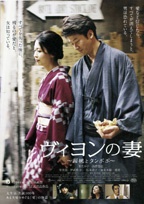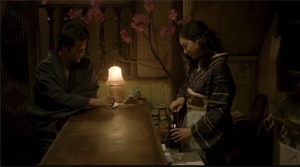

Viyon no tsuma
Japan 2009
Genre:
Drama
Director:
Kichitaro Negishi
Cast:
Tadanobu Asano
Takako Matsu
Satoshi Tsumabuki
Ryoko Hirosue
Shigeru Muroi
Masato Ibu
Shinichi Tsutsumi

Villon's Wife
Story: Otani (Tadanobu Asano) is a writer, but his success doesn't help him to overcome his
depression. He drinks every day and has an affair every now and then as well. His behavior sickens himself, but he
can't help it and so, to make matters worse, he also steals a big amount of money from two owners of an inn, making them
visit him at home and threaten him to call the police. Otani's wife Sachi (Takako Matsu) promises to find a solution and
insists on helping out at the inn until the owners have their money back. The owners are delighted by the sweet-tempered
and very beautiful woman who is responsible for a full house and happy customers. After the money has actually been paid
back, Sachi continous working at the inn. Meanwhile, Otani is still giving in to alcohol and has an affair with
Akiko (Ryoko Hirosue). But the young student Okada (Satoshi Tsumabuki) has an interest in Sachi and so the lives of the
married couple seem to take an unforeseen path...
Review: "Villon's Wife" is a quiet drama that is multilayered and carries its story forward in an
extremely interesting way. Because even though the movie is in many respects supposed to focus on the writer Villon it
in fact revolves around his wife and her struggle with a self-destructive artist as well as her emancipation. Sachi starts to
take life into her own hands more and more and thus gives the marriage new facets as she doesn't just remain the
victim of adultery anymore who peacefully stays at home waiting for her husband to return. Accordingly, she breaks with
traditional Japanese patterns and at the same time mirrors the post-war years. A time of uncertainty, but also a time of a new dawn.
Only with strength Sachi can get her life back together and maybe even save her husband.

However, the drama has one problem: The intention to center the events around Sachi may be apparent - as is obvious when
looking at the film's title, too - but Otani is a more interesting individual. He dreams of commiting suicide, but has
never before seriously attempted it. He is afraid of life, but also of death, as he states himself at one point. Thus
he can only find comfort in alcohol and a few affairs. For this he hates himself and his talent as a writer sickens him,
too. Otani seems to be lost without any hope of salvation, if it weren't for his wife, who - whether he knows it or not -
is someone for him to lean on. No doubt, Tadanobu Asano ("Survive Style 5+",
"Vengeance Can Wait") outshines the main actress often enough, meaning
that you even miss Otani when he isn't on screen.

"Villon's Wife" is also fascinating since it is based on a novel by the same name from Osamu Dazai, a semi-autobiographical
story. One year after the novel has been published Dazai eventually and successfully managed to commit suicide (after a few
failed attempts). If the movie hadn't enough depth on its own already this background information alone would make sure it
has. Apart from that the era the picture is set in is chosen well, too. Post-war Japan as a setting gives the movie a
very unique atmosphere somewhere between tradition and modern age and is therefore also a parallel to Otani, who also
wanders between two worlds. But this wandering in the twilight applies to Sachi as well. She lives in an era in which women
slowly start to become more equal to men and she enjoys the power she gets, too.
Takako Matsu ("Confessions", "The Hidden Blade") delivers
a subtle performance and isn't just the good housewife. Yet, there lies some sort of faithfulness towards her husband in her
which makes her do things that then again are unusual for a woman at that time. This makes "Villon's Wife" everything
but predictable. Moreover, it is the dynamic relationship of the husband and his wife that shape the drama into something fascinating.
The relationship partly undergoes some serious changes and for both of them it is thus necessary to locate their new place
in this relationship. Sachi is a good and self-sacrificing woman many men have already fallen in love with, as some subplots
and flashbacks are proof of. Otani on the other hand is a husband who doesn't deserve the love of his wife. But it is
in fact the burden of a depressive character and a longing for death that puts the necessary spicyness into the
story.

You can always tell that "Villon's Wife" has its roots in the literary world. Veteran director Kichitaro Negishi composes quiet pictures and where necessary keeps the camera's lense on a scene without a single cut. A soundtrack is used only when there is need of it and thus it accompanies the action in a pleasantly unobtrusive manner. Its slow pacing should make this drama difficult to access, but in a certain way there is always something happening that pushes to story forward. "Villon's Wife" is a character-driven drama which is astonishingly complex in elaborating its characters. Apart from that the movies has also something pleasantly poetic about it. Maybe this drama is sometimes a bit lengthy, particularly towards the end the movie loses some of its momentum, but you can't deny its quiet beauty of melancholy.

Disclaimer

















